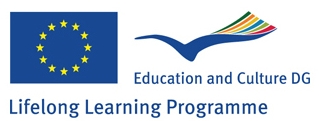You are here
Objectives and Strategy
Concrete objectives of the partnership:
- creating peda/gerontagogical tools adjusted for different age groups in workshops or classes studying generational issues.
- communicating and exchanging the outcomes and good practices.
- increasing awareness of learners and staff of the existence of intergenerational issues and improving relationships between age groups.
- increasing the knowledge we have regarding the lifestyles of other generation groups and breaking the barriers of stereotyped perceptions related to age.
As a result the project intends to answer the following questions participants ask themselves about their own lifestyles and those of others:
- Who are we?
- Who are they? What do we know, think about them?
- What do they know, think about us?
- What do we have in common?
- What could we teach them and learn from them and how?
- Could we learn together? How?
- Which obstacles are we facing and how could we overcome them?
The project develops in the form of workshop modules, study circles or classes along common lines, each “generation” group addressing a number of predefined issue. As the process develops and at each stage notes are taken by the project moderators concerning people’s reactions to the proposed activities and content. The notes are assembled and discussed by the partners to form an educational material pool to create best peda/gerontagogical practices.
- Identifying the various learner and staff populations in terms of age, sex and origin.
-
Target groups of different ages define their own lifestyle variables.
- Physical aspects: housing, living places, architectural design, clothes and fashion, artistic tastes, eating habits, etc.
- Subjective aspects: opinions, attitudes, behaviour, beliefs, social values, skills, knowledge, experience, etc.
- Target groups define their perceptions of lifestyles of other age groups.
- Target groups define the way they think other groups perceive them.
- Target groups exchange and compare their papers, assessing what has been discovered and discuss the impact of their findings.
- Target groups define which areas of knowledge and experience they would like to acquire from each other.
- Target groups discuss the opportunities offered by intergenerational learning and teaching and their necessary conditions.
At each stage the target groups assemble and illustrate their productions and they evaluate the progress made in between stages using common assessment tools (F.5)
Theme by Danetsoft and Danang Probo Sayekti inspired by Maksimer

